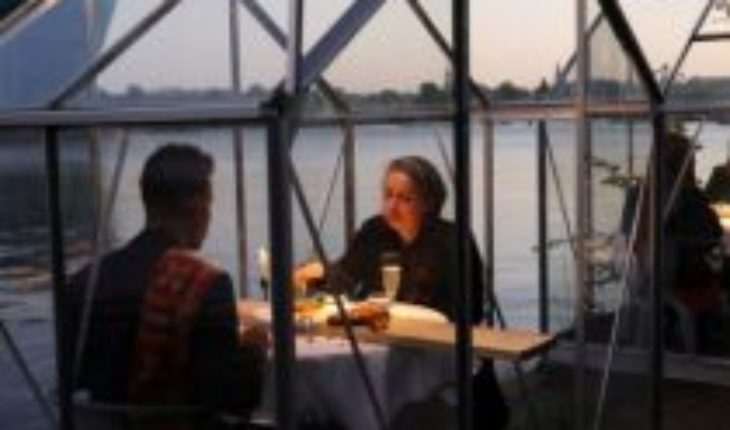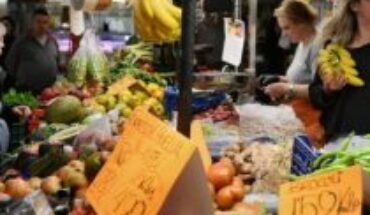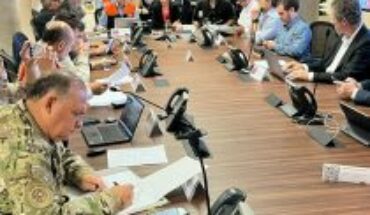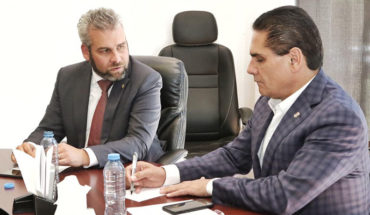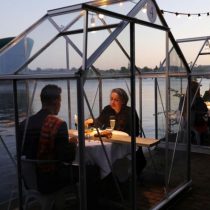
The revival of the economy is one of the central themes of most countries affected by the paralysis of trade activity due to the coronavirus pandemic in the world.
After months of confinement, many industries, businesses, businesses and other guilds have been hit so hard that they fear they are about to disappear.
The dilemma is how to restart activity, reopen doors and serve an audience without putting it at risk of infection in the era of social estrangement.
The need is, of course, the mother of invention: many sectors have taken ingenious ways to cope with the crisis while adjusting to the new reality.
End of quarantine: “social bubbles,” New Zealand’s strategy to exit quarantine and shuffle other countries
Coronavirus and economy: how the Great Depression looked at that of comparing the economic impact of the pandemic
Here are some who have applied the most eye-catching ideas.
Restaurants and bars
The catering sector has been one of the most impacted by the pandemic.
The business itself implies a close proximity of the staff who provide the services during the preparation of meals.
There is also a natural close contact between waiters and clientele when taking orders and serving dishes, which limit this business under the current circumstances.
The Mediamatic Eten restaurant in Amsterdam has solved the problem of keeping the service away from the diner. To comply with the new rules, a restaurant in Amsterdam, the Netherlands, has created a kind of “mini-winters” that can accommodate diners, reducing the risk of exposure to the virus.
Mediamatic Eten, the canal-side establishment, began a series of greenhouse trials that insulate individual tables from one to three stalls.
The waiters, equipped with transparent masks and gloves, serve the dishes on long boards to keep the distance.
Although “caged”, the transparency of the greenhouses allows to see the whole clientele and create a warm and communal atmosphere.
3 Ways the Covid-19 Pandemic Can Change Our Lives Permanently
Bars, on the other hand, have a greater difficulty in controlling the distances between their customers, many of whom drink standing and tend to prowl the venue in search of company.
But that hasn’t been an obstacle for Fish Tales, off the coast of the state of Maryland, USA, who has managed to give each customer their own “island.”
Each customer has their own movable table in the Fish bar Tales.Se it is basically a round table about two meters in diameter, a large tire in whose center the customer is placed. The table is on wheels, allowing for travel.
After a couple of drinks one could imagine a competition between chocones cars.
Shows and entertainment
A locked-up room with hundreds of people sitting shoulder to shoulder, some squinting or sighing, others coughing and sneezing are the worst-case scenario for containing the spread of a virus.
The coronavirus has brought the drive-in back to popularity. But that’s the situation of cinemas and theaters. Not to mention the crowding in the baths, the bar or the sweet shop during the intermission.
These shows depend on the masses, but no one said they had to enjoy the seating in an armchair. This is how, in the era of the pandemic, it has revived a tradition of the 50s and 60s: the drive-in.
They were particularly popular in the US, but now moviegoers in many parts of the world can watch movies on giant screen from the safety of their own four-wheel bubble.
As these sites require a very large area to accommodate numerous vehicles, in Uruguay they have decided to convert two airports – unused by flight cancellation – into drive-ins.
One will be installed at Carrasco International Airport in Montevideo, where the tapes will be projected on a screen 20 meters long and 16 high, with the parking of the terminal as space for the public in their cars.
According to the newspaper El Observador, other shows such as concerts and comedy shows are also planned.
A concert was already organized in the Czech Republic where spectators were in their cars.
In the Czech Republic they organized a concert with spectators in their cars. Ceremonies and rituals
And the drive-in doesn’t just serve to watch movies. In Dusseldorf, Germany, three couples cthey were married in a drive-in, while their guests accompanied them from their cars.
“If any of those present oppose the marriage of this couple that sounds their horn now or the street forever.” Germany is in a gradual process of reopening, although the rules of social estrangement are strictly observed.
The weddings were officiated on a flowered platform by the mayor of Dusseldorf, who was separated from each couple by a plastic window, while the guests sounded the loudspeakers in approval.
Coronavirus in Germany: country gives green light to reopening stores and restarting football without spectators
Meanwhile, in Detroit, USA, Catholic priest Timothy Pelc doesn’t have all that space in his St. Ambrose church to provide spiritual support to his parish without risking his health.
The solution has been for parishioners to drive their choche slowly in front of the church while Father Pelc sprays them with holy water, at a cautious distance, with a water gun.
A blessing and a good aim. Fashion
Speaking of weddings, the wedding dress making industry is also adjusting to current needs.
In Catania, Italy, designer Mariella Gennarino incorporates a protective mask with the same lace of the bride’s veil that, at the same time, matches and recognizes the reality of the situation, while Italy declares the reopening of its cities and businesses.
Fabric masks: how they are made and what are the mistakes when using them
A bride in a fine lace mask. Men’s fashion is also being transformed by protection against coronavirus.
The traditional luxury brand van Laak, in Moenchengladbach, Germany, has been known since 1881 for its fine quality shirts and has now been dedicated to producing protective masks of the same fabrics. These, like the tie and the handkerchief, match the shirt.
In Germany, the use of the mask has become mandatory when it comes out in public, making them already the new accessory in dressing.
The protective mask, an indispensable accessory of the well-dressed and healthy man. Every bather in your painting, please. Outdoor recreation
Nothing like going to the beach, especially when summer approaches in the northern hemisphere and people are already tired of their confinement.
In Spain, which has also begun to relax movement restrictions, they have decided to plot some of the beaches.
A tractor in Torre del Mar, draws lines in the sand to demarcate areas of about two and a half meters so that the bathers can observe the distance while enjoying the sea, while minimizing the spread of covid-19.
As more and more people routinely start to leave the streets of cities such as Bordeaux in France, the widest sidewalks are made to respect the distance.
Two ways have even been created to come and go and avoid possible pedestrian crashes, although not everyone respects the signage, like the woman in the photo above.
In Paris, on the other hand, cyclists will enjoy wider roads now that metro and bus transport is being discouraged.
Will she be fined for going against? New cycleways in Paris.

